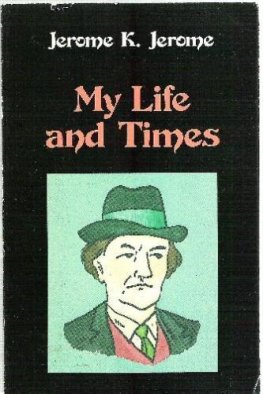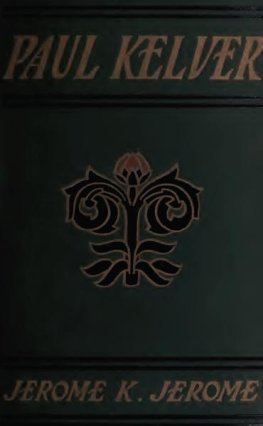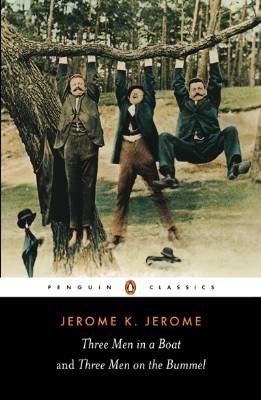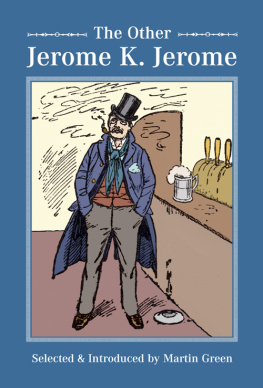Jerome Jerome - The Cost of Kindness
Here you can read online Jerome Jerome - The Cost of Kindness full text of the book (entire story) in english for free. Download pdf and epub, get meaning, cover and reviews about this ebook. City: New York, year: 1908, publisher: Dodd, Mead & Company, genre: Humor. Description of the work, (preface) as well as reviews are available. Best literature library LitArk.com created for fans of good reading and offers a wide selection of genres:
Romance novel
Science fiction
Adventure
Detective
Science
History
Home and family
Prose
Art
Politics
Computer
Non-fiction
Religion
Business
Children
Humor
Choose a favorite category and find really read worthwhile books. Enjoy immersion in the world of imagination, feel the emotions of the characters or learn something new for yourself, make an fascinating discovery.
- Book:The Cost of Kindness
- Author:
- Publisher:Dodd, Mead & Company
- Genre:
- Year:1908
- City:New York
- Rating:4 / 5
- Favourites:Add to favourites
- Your mark:
- 80
- 1
- 2
- 3
- 4
- 5
The Cost of Kindness: summary, description and annotation
We offer to read an annotation, description, summary or preface (depends on what the author of the book "The Cost of Kindness" wrote himself). If you haven't found the necessary information about the book — write in the comments, we will try to find it.
The Cost of Kindness — read online for free the complete book (whole text) full work
Below is the text of the book, divided by pages. System saving the place of the last page read, allows you to conveniently read the book "The Cost of Kindness" online for free, without having to search again every time where you left off. Put a bookmark, and you can go to the page where you finished reading at any time.
Font size:
Interval:
Bookmark:
Jerome K. Jerome
The Cost of Kindness
Kindness, argued little Mrs. Pennycoop, costs nothing.
And, speaking generally, my dear, is valued precisely at cost price, retorted Mr. Pennycoop, who, as an auctioneer of twenty years' experience, had enjoyed much opportunity of testing the attitude of the public towards sentiment.
I don't care what you say, George, persisted his wife; he may be a disagreeable, cantankerous old bruteI don't say he isn't. All the same, the man is going away, and we may never see him again.
If I thought there was any fear of our doing so, observed Mr. Pennycoop, I'd turn my back on the Church of England to-morrow and become a Methodist.
Don't talk like that, George, his wife admonished him, reprovingly; the Lord might be listening to you.
If the Lord had to listen to old Cracklethorpe He'd sympathize with me, was the opinion of Mr. Pennycoop.
The Lord sends us our trials, and they are meant for our good, explained his wife. They are meant to teach us patience.
You are not churchwarden, retorted her husband; you can get away from him. You hear him when he is in the pulpit, where, to a certain extent, he is bound to keep his temper.
You forget the rummage sale, George, Mrs. Pennycoop reminded him; to say nothing of the church decorations.
The rummage sale, Mr. Pennycoop pointed out to her, occurs only once a year, and at that time your own temper, I have noticed
I always try to remember I am a Christian, interrupted little Mrs. Pennycoop. I do not pretend to be a saint, but whatever I say I am always sorry for it afterwardsyou know I am, George.
It's what I am saying, explained her husband. A vicar who has contrived in three years to make every member of his congregation hate the very sight of a churchwell, there's something wrong about it somewhere.
Mrs. Pennycoop, gentlest of little women, laid her plump and still pretty hands upon her husband's shoulders. Don't think, dear, I haven't sympathized with you. You have borne it nobly. I have marvelled sometimes that you have been able to control yourself as you have done, most times; the things that he has said to you.
Mr. Pennycoop had slid unconsciously into an attitude suggestive of petrified virtue, lately discovered.
One's own poor self, observed Mr. Pennycoop, in accents of proud humilityinsults that are merely personal one can put up with. Though even there, added the senior churchwarden, with momentary descent towards the plane of human nature, nobody cares to have it hinted publicly across the vestry table that one has chosen to collect from the left side for the express purpose of artfully passing over one's own family.
The children have always had their three-penny-bits ready waiting in their hands, explained Mrs. Pennycoop, indignantly.
It's the sort of thing he says merely for the sake of making a disturbance, continued the senior churchwarden. It's the things he does I draw the line at.
The things he has done, you mean, dear, laughed the little woman, with the accent on the has. It is all over now, and we are going to be rid of him. I expect, dear, if we only knew, we should find it was his liver. You know, George, I remarked to you the first day that he came how pasty he looked and what a singularly unpleasant mouth he had. People can't help these things, you know, dear. One should look upon them in the light of afflictions and be sorry for them.
I could forgive him doing what he does if he didn't seem to enjoy it, said the senior churchwarden. But, as you say, dear, he is going, and all I hope and pray is that we never see his like again.
And you'll come with me to call upon him, George, urged kind little Mrs. Pennycoop. After all, he has been our vicar for three years, and he must be feeling it, poor manwhatever he may pretendgoing away like this, knowing that everybody is glad to see the back of him.
Well, I sha'n't say anything I don't really feel, stipulated Mr. Pennycoop.
That will be all right, dear, laughed his wife, so long as you don't say what you do feel. And we'll both of us keep our temper, further suggested the little woman, whatever happens. Remember, it will be for the last time.
Little Mrs. Pennycoop's intention was kind and Christianlike. The Rev. Augustus Cracklethorpe would be quitting Wychwood-on-the-Heath the following Monday, never to set footso the Rev. Augustus Cracklethorpe himself and every single member of his congregation hoped sincerelyin the neighbourhood again. Hitherto no pains had been taken on either side to disguise the mutual joy with which the parting was looked forward to. The Rev. Augustus Cracklethorpe, M.A., might possibly have been of service to his Church in, say, some East-end parish of unsavoury reputation, some mission station far advanced amid the hordes of heathendom. There his inborn instinct of antagonism to everybody and everything surrounding him, his unconquerable disregard for other people's views and feelings, his inspired conviction that everybody but himself was bound to be always wrong about everything, combined with determination to act and speak fearlessly in such belief, might have found their uses. In picturesque little Wychwood-on-the-Heath, among the Kentish hills, retreat beloved of the retired tradesman, the spinster of moderate means, the reformed Bohemian developing latent instincts towards respectability, these qualities made only for scandal and disunion.
For the past two years the Rev. Cracklethorpe's parishioners, assisted by such other of the inhabitants of Wychwood-on-the-Heath as had happened to come into personal contact with the reverend gentleman, had sought to impress upon him, by hints and innuendoes difficult to misunderstand, their cordial and daily-increasing dislike of him, both as a parson and a man. Matters had come to a head by the determination officially announced to him that, failing other alternatives, a deputation of his leading parishioners would wait upon his bishop. This it was that had brought it home to the Rev. Augustus Cracklethorpe that, as the spiritual guide and comforter of Wychwood-on-the Heath, he had proved a failure. The Rev. Augustus had sought and secured the care of other souls. The following Sunday morning he had arranged to preach his farewell sermon, and the occasion promised to be a success from every point of view. Churchgoers who had not visited St. Jude's for months had promised themselves the luxury of feeling they were listening to the Rev. Augustus Cracklethorpe for the last time. The Rev. Augustus Cracklethorpe had prepared a sermon that for plain speaking and directness was likely to leave an impression. The parishioners of St. Jude's, Wychwood-on-the-Heath, had their failings, as we all have. The Rev. Augustus flattered himself that he had not missed out a single one, and was looking forward with pleasurable anticipation to the sensation that his remarks, from his firstly to his sixthly and lastly, were likely to create.
What marred the entire business was the impulsiveness of little Mrs. Pennycoop. The Rev. Augustus Cracklethorpe, informed in his study on the Wednesday afternoon that Mr. and Mrs. Pennycoop had called, entered the drawing-room a quarter of an hour later, cold and severe; and, without offering to shake hands, requested to be informed as shortly as possible for what purpose he had been disturbed. Mrs. Pennycoop had had her speech ready to her tongue. It was just what it should have been, and no more.
It referred casually, without insisting on the point, to the duty incumbent upon all of us to remember on occasion we were Christians; that our privilege it was to forgive and forget; that, generally speaking, there are faults on both sides; that partings should never take place in anger; in short, that little Mrs. Pennycoop and George, her husband, as he was waiting to say for himself, were sorry for everything and anything they may have said or done in the past to hurt the feelings of the Rev. Augustus Cracklethorpe, and would like to shake hands with him and wish him every happiness for the future. The chilling attitude of the Rev. Augustus scattered that carefully-rehearsed speech to the winds. It left Mrs. Pennycoop nothing but to retire in choking silence, or to fling herself upon the inspiration of the moment and make up something new. She choose the latter alternative.
Font size:
Interval:
Bookmark:
Similar books «The Cost of Kindness»
Look at similar books to The Cost of Kindness. We have selected literature similar in name and meaning in the hope of providing readers with more options to find new, interesting, not yet read works.
Discussion, reviews of the book The Cost of Kindness and just readers' own opinions. Leave your comments, write what you think about the work, its meaning or the main characters. Specify what exactly you liked and what you didn't like, and why you think so.














